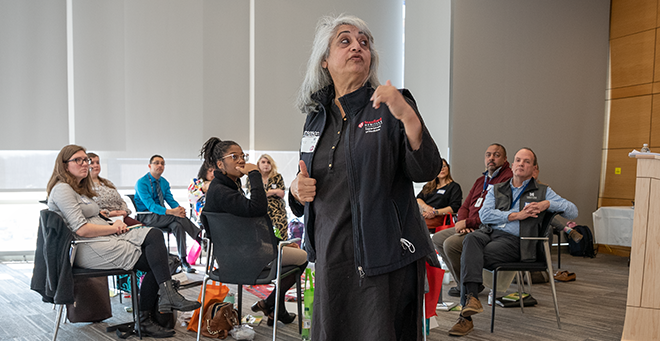
Restorative justice, a means of conflict resolution and community building applied in student and faculty affairs across universities nationwide, is making its way into medical education and UMass Chan Medical School is getting involved.
The Diversity and Inclusion Office sponsored training in restorative justice Jan. 30 through Feb. 1 for more than 30 faculty, residents and staff. The three-day educational session focused on community building. Facilitators from the Center for Restorative Justice at the University of San Diego provided the training.
“The goal of this training is to have a network of UMass Chan Medical School community members trained to create and foster spaces where intentional communication about our values and our experiences is possible, and where we can build relationships that are transformational rather than transactional,” said Lynn Hernandez, PhD, assistant vice chancellor for diversity and inclusion, who was instrumental in organizing the training. “While many of us at UMass Chan were already engaging in community-building practices, this training offered us a structure that helps establish a safe and supportive space intended to promote authentic and equitable conversation.
“When we focus on community building and making meaningful connections with one another, we also become better equipped to resolve conflicts,” she said.
Over the three days, participants learned about the basic principles of restorative justice, which focus on harms and needs rather than law or policy through a non-adversarial and multipartial and relational approach. Key practices in this process include circles and conferences that are meant to make participating parties feel empowered through a collaborative decision-making process.
Dating to the mid-1970s, the practice of restorative justice originated from a need to mitigate major conflicts in communities caused by unjust policing, genocide and animosity between victims and offenders within the criminal justice system. In 2020, after assessing the value of restorative justice as a means of intervention, the Association of American Medical Colleges piloted a restorative justice training program at five institutions and is now encouraging all medical schools to adopt the practice.
According to the AAMC, “in contrast to traditional institutional response systems which focus on corrective behavior of the person who caused harm, restorative justice has been shown to be an effective method to teach individuals the impact of the harms they have caused, to deter recidivism and facilitate overall community resolution.”
Dr. Hernandez said the plan for restorative justice at UMass Chan is “to create a community of practice that meets once a month to discuss what we learned, how we practice it and how we teach it.”